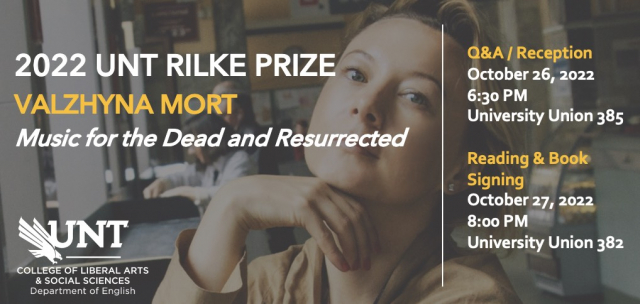October 26, 2022
Reception / Q&A
6:30 p.m.
University Union 385
Light refreshments will be served.
Note: In addition to the reception, a reading and book signing with Valzhyna Mort will take place October 27, 2022 in University Union 382. Follow the link below for more information about our UNT Rilke Prize events.

Valzhyna Mort's Music for the Dead and Resurrected (Farrar, Straus and Giroux) has won the 2022 UNT Rilke Prize. The $10,000 prize recognizes a book written by a mid-career poet and published in the preceding year that demonstrates exceptional artistry and vision. Mort will visit UNT on October 26-27, 2022 for a reading, book signing, and reception.
Songs of grieving, memory, and witness lie at the center of Valzhyna Mort's latest collection, Music for the Dead and Resurrected, a book that makes vivid and palpable the upended history of Belarus, a country filled with "forests / of the unburied dead" and tanks driving through the streets. "The empire fell, then snow fell," Mort writes in "Self-Portrait with Madonna on Pravda Avenue," pravda meaning truth, a Russian word that, under Soviet rule implied propaganda, disinformation, and the suppression of free speech. Here, the poet reclaims the word. She restores truth in lines informed by historical insight--invasions and wars, exile, the nuclear catastrophe of Chernobyl--and by a biting humor so characteristic of the region. "What has kept us alive?" a speaker asks. "Our death songs" is the dry answer. Mort's poems enact both an elegy and an affirmation that survival is possible, that tongues can go on speaking, "tied with a black ribbon of verse."
Valzhyna Mort is a poet and translator born in Minsk, Belarus. She is the author of three poetry collections, Factory of Tears (Copper Canyon Press 2008), Collected Body (Copper Canyon Press 2011) and, mostly recently, Music for the Dead and Resurrected (FSG 2020), named one of the best poetry books of 2020 by The New York Times, and the winner of the International Griffin Poetry Prize. Mort is a recipient of fellowships from the American Academy in Rome, the Lannan Foundation, and the Amy Clampitt Foundation. Her work has been honored with the Bess Hokin Prize from Poetry, the Glenna Luschei Prairie Schooner Award, and was shortlisted for the Forward Prize. Her work has appeared in Best American Poetry, New Yorker, Poetry, Poetry Review, Poetry International, Prairie Schooner, Granta, Gulf Coast, White Review, and many more. With Ilya Kaminsky and Katie Farris, Mort co-edited Gossip and Metaphysics: Russian Modernist Poems and Prose. Mort teaches at Cornell University and writes in English and Belarusian. She translates between English, Belarusian, Russian, Ukrainian, and Polish. She has received the Gulf Coast Prize in Translation and the National Endowment for the Arts grant in translation for her work on Polina Barskova's book of selected poems Air Raid (Ugly Duckling 2021). https://www.valzhynamort.com/
For more information visit our UNT Rilke Prize webpage: https://english.unt.edu/creative-writing/unt-rilke-prize

